This article dives into some effective generalization strategies that you, as a parent, can easily implement at home to support your child's learning through Applied Behavior Analysis (ABA) therapy. It highlights how personalized approaches—like using visual supports, teaching in natural environments, and applying reinforcement techniques—can really make a difference. By involving caregivers in the therapeutic process, these strategies not only enhance skill transfer but also improve behavioral outcomes.
Let’s face it, parenting can be challenging, especially when it comes to supporting your child's learning journey. But don’t worry! You’re not alone in this. Picture this: you’re using visual aids during snack time to reinforce communication skills. It’s simple, yet so effective! These little moments can transform everyday activities into learning opportunities.
By embracing these strategies, you’re not just helping your child; you’re also creating a supportive environment that fosters growth. Remember, every small step counts! So, let’s explore this together and see how you can make a positive impact on your child’s learning experience. We’re here to help you every step of the way!
Understanding how to effectively implement Applied Behavior Analysis (ABA) strategies at home can truly enhance a child's learning and development. 🌟 By using personalized generalization techniques, parents can create an environment that encourages skill application in real-life situations. This ultimately leads to greater independence and improved social interactions.
However, many caregivers encounter challenges when trying to translate these strategies from therapy sessions into everyday life. What are the best practices that can bridge this gap and empower parents to support their child's growth effectively? Let’s explore this together! 😊
At Rori Care, we truly believe in the power of personalized generalization strategies ABA in therapy. Ability generalization—the ability to use learned skills in different settings—is a key goal of tailored ABA therapy. To make this work, it's essential for parents to understand their child's unique needs and behaviors. This means teaming up with clinicians to create individualized plans that fit seamlessly into everyday life.
For example, if your child learns to ask for items during therapy, you can create opportunities at home for them to practice this skill in different situations, like mealtime or playtime. This not only reinforces their learning but also helps them use their skills in various environments, boosting their ability to generalize what they've learned.
Research shows that when parents get involved, kids often see better outcomes, like improved communication and social skills, leading to greater independence. To keep things on track, treatment plans should be regularly updated based on progress reports, allowing for changes that reflect your child's evolving needs.
It's also important to recognize that challenges may pop up, like inconsistent progress or difficulties with generalization. But don't worry! By using adaptive strategies and ongoing evaluation, you can tackle these challenges head-on. A customized approach in ABA therapy is vital to meet each child's unique needs, enhancing their overall growth and quality of life.
By empowering caregivers with ABA principles and generalization strategies ABA, Rori Care enhances engagement and supports skill generalization, making the entire treatment process more effective. Let’s explore this journey together—we’re here to help you every step of the way!
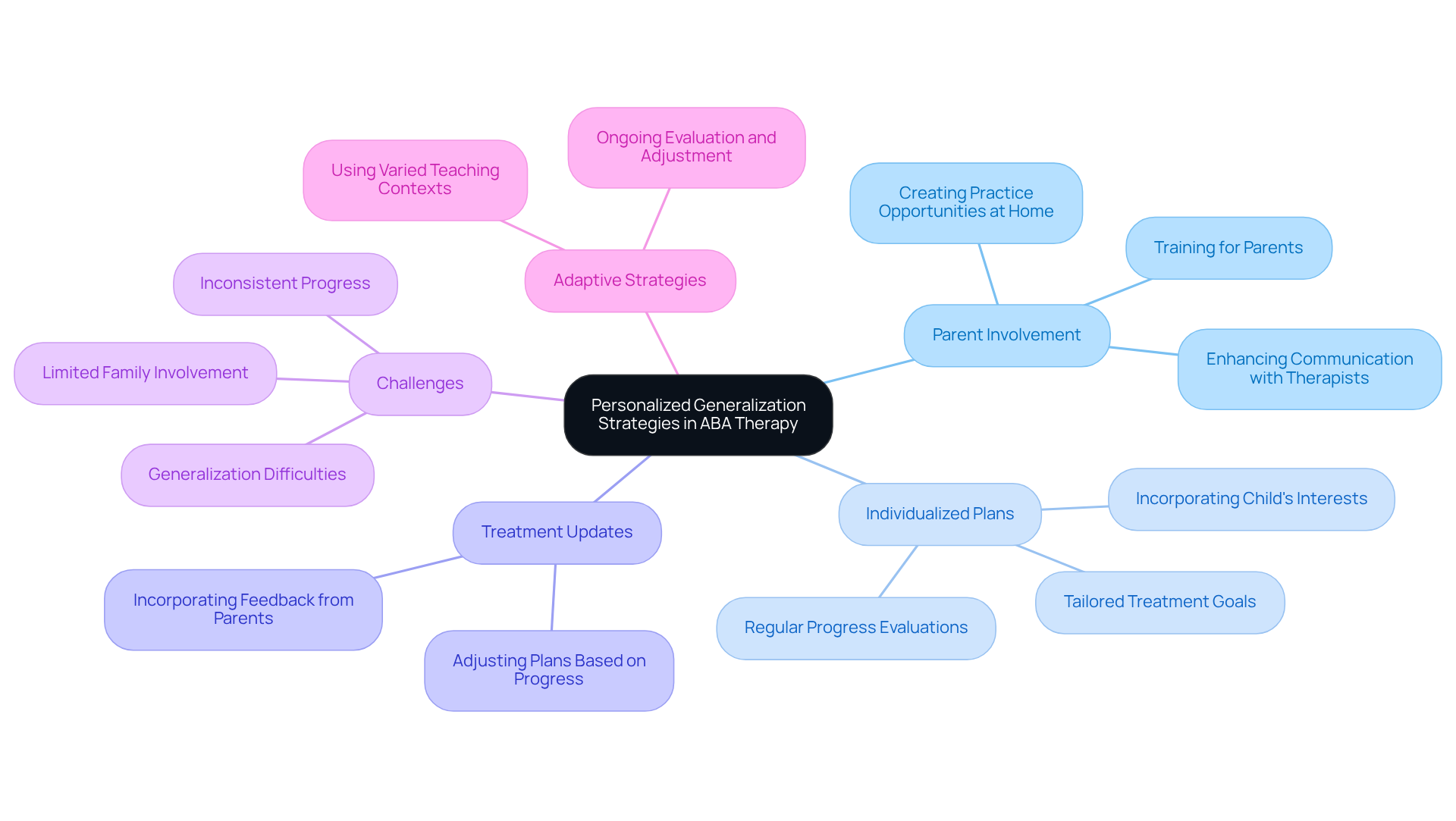
Visual aids, like schedules, charts, and picture cues, are so important in ABA therapy! They help young individuals understand what to expect and create a clear framework for their daily activities. A qualified behavior analyst crafts personalized plans that incorporate generalization strategies in ABA and visual aids, ensuring they align with measurable goals and evidence-based strategies for positive behavior change.
For example, a visual timetable can outline the day's activities, helping kids anticipate changes and reduce stress. By involving caregivers in this process, they can create visual aids that reflect their loved one's daily routines. This not only reinforces the skills learned during therapy but also helps apply them to real-life situations.
This partnership enhances the young person's understanding and equips caregivers with the knowledge and skills needed to support their child's behavioral goals effectively. Let’s explore this together! Your involvement can make a significant difference!
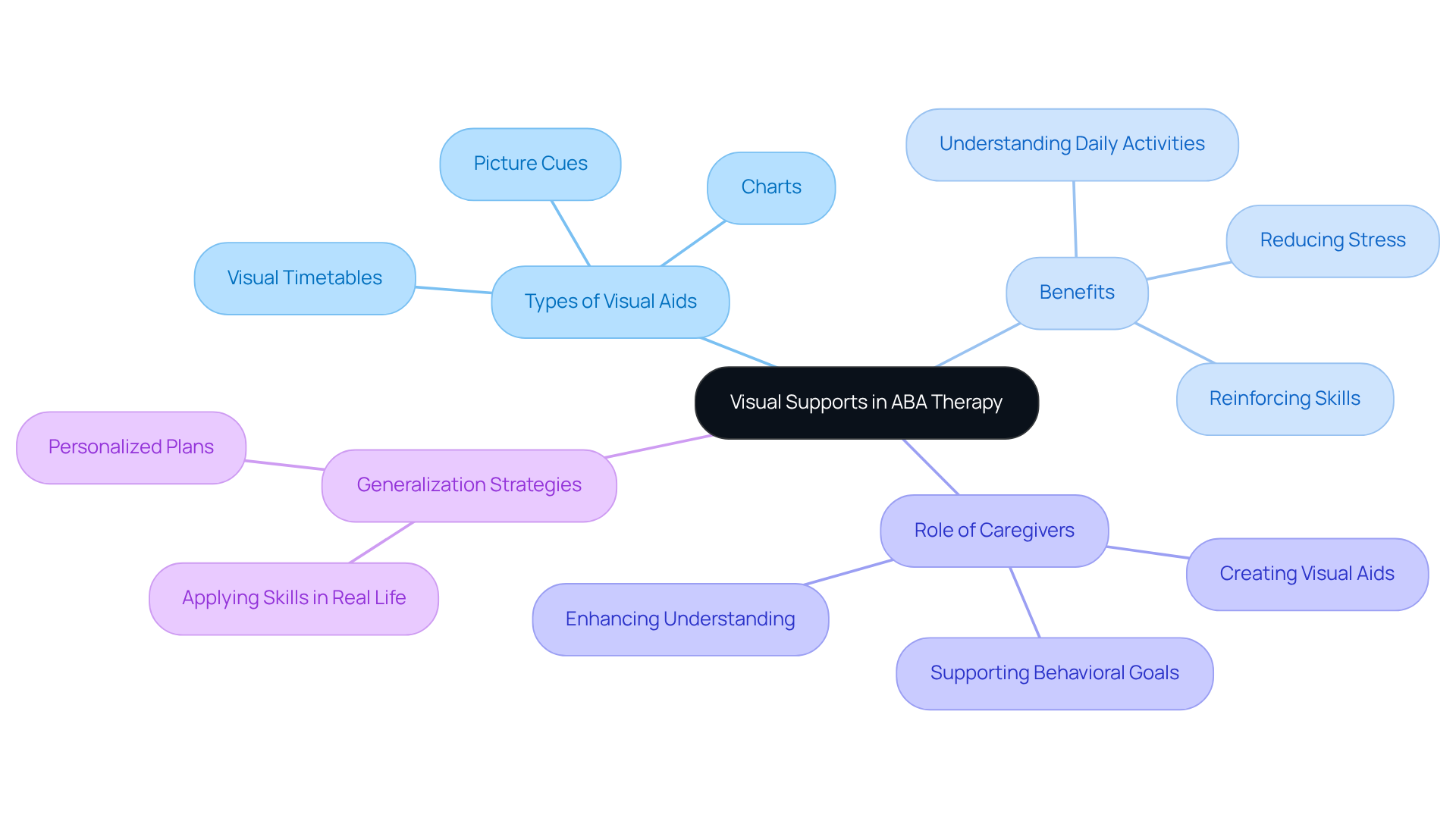
Natural Environment Teaching (NET) is all about making learning feel applicable and meaningful in our daily lives. As parents, you can easily weave NET into your routines by spotting those teachable moments during activities like grocery shopping or cooking. For example, when preparing a meal, why not involve your little ones in measuring ingredients? It’s a fun way to boost their math skills in a real-world setting!
This approach not only supports learning but also helps children employ generalization strategies aba, allowing them to use what they’ve learned in familiar environments. By turning everyday activities into learning opportunities, you can encourage your child’s independence and help them transfer their skills across different situations. Plus, having qualified behavior analysts on board can really make a difference. They design personalized plans that align with the generalization strategies aba, ensuring that you get the support you need for better behavioral outcomes and informed decisions. Let’s explore this together and see how we can make learning a part of our everyday lives!
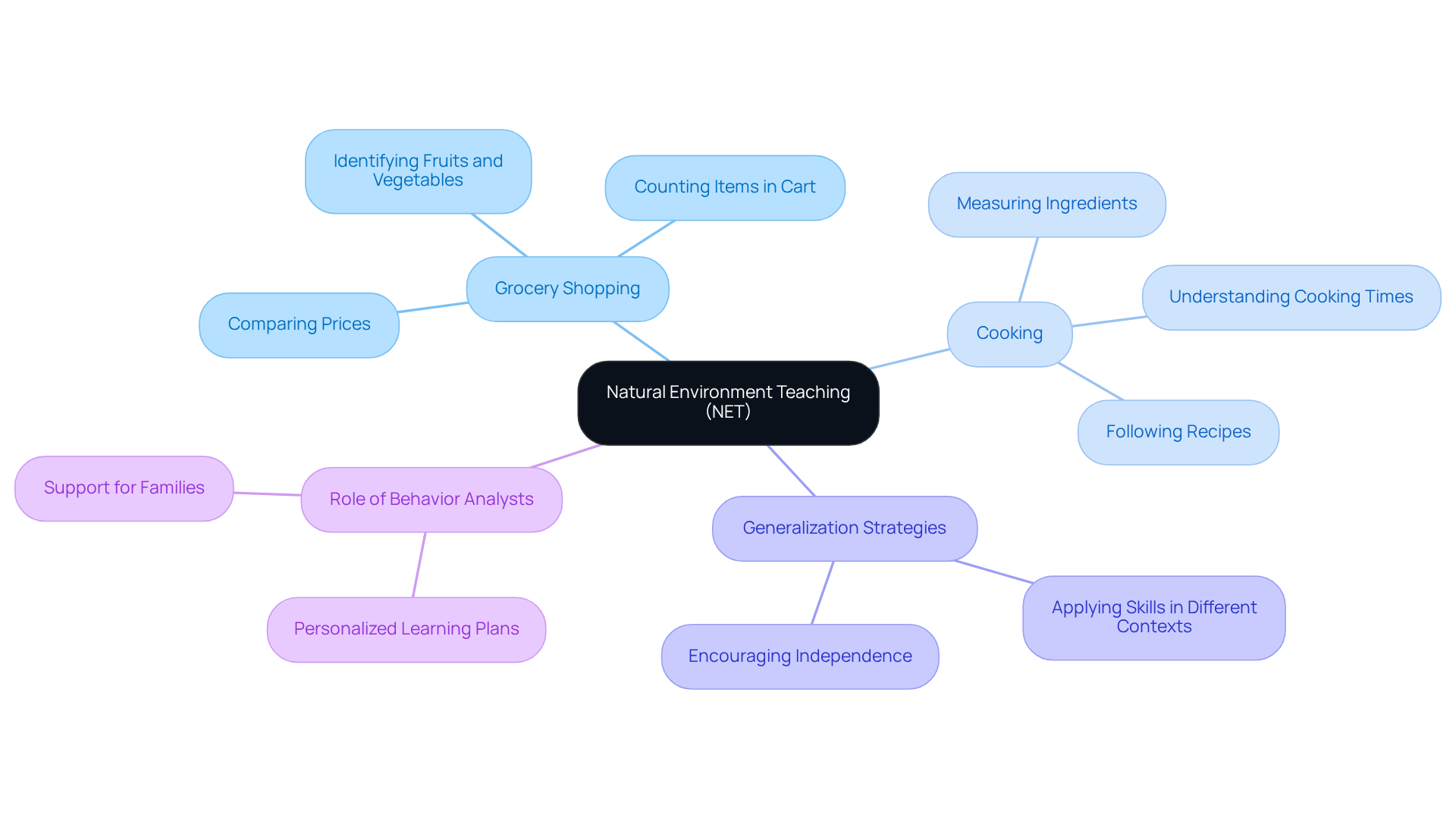
Parent training is a cornerstone of effective ABA therapy at Rori Care, empowering families with the skills they need to implement proven techniques at home. Our comprehensive training sessions cover a variety of topics, like reinforcement strategies, prompting techniques, and behavior management, all aimed at enhancing the therapeutic environment. Research shows that caregiver training can significantly boost treatment outcomes, with studies indicating that involved guardians can increase the effectiveness of ABA interventions by fostering consistency in applying techniques. For instance, when caregivers master positive reinforcement, they can consistently promote desired behaviors, leading to remarkable progress in their child's development.
Programs focusing on Behavior Skills Training (BST) have been particularly effective, enhancing caregiver engagement and treatment integrity, ultimately benefiting the entire family system. By actively participating in these training sessions, guardians not only learn to create supportive environments but also become essential partners in their child's ABA journey. This partnership ensures that the skills learned in therapy are generalized and maintained in everyday life by implementing generalization strategies aba. Plus, caregiver education encourages informed decision-making, leading to better behavioral outcomes and empowering families to make choices that positively influence their child's development.
As Sofia's mother shared, "Rori Care made us feel like true partners in Sofia’s therapy journey. Through training, we gained hope and control. Learning simple techniques made remarkable progress possible for my daughter." To further enhance the effectiveness of parent training, families are encouraged to schedule regular practice sessions at home to reinforce the techniques learned. Let’s explore this together! We’re here to help you every step of the way!
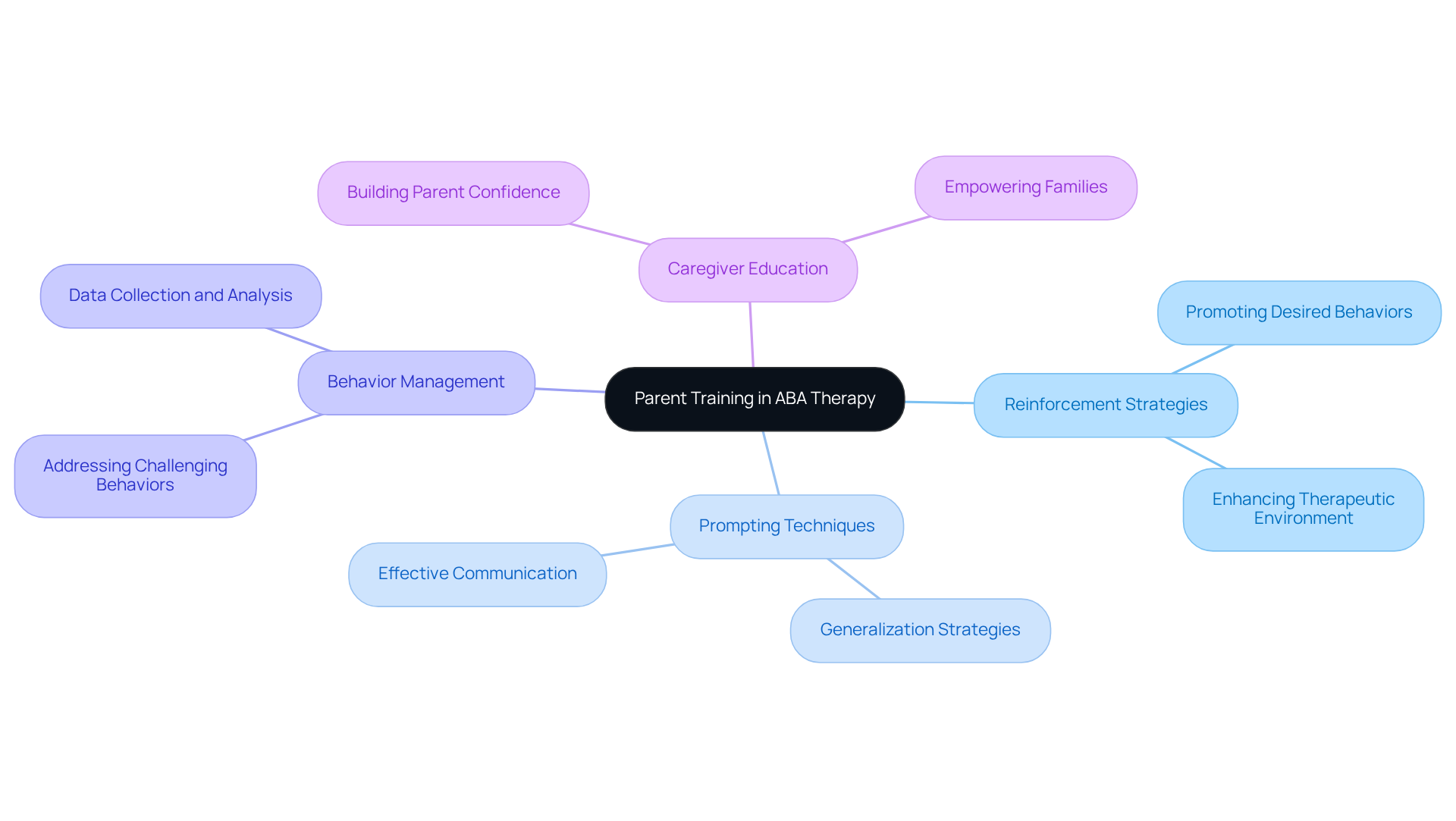
Reinforcement strategies are so important in encouraging preferred behaviors in individuals with autism! Parents can use different forms of reinforcement—like verbal praise, tokens, or fun activities—to effectively motivate their kids. For example, when a little one successfully completes a task, offering immediate praise or a small reward can really strengthen that behavior, making it more likely to happen again. Research shows that specific praise is especially powerful; it not only acknowledges the child's effort but also clarifies which behavior is being reinforced.
To make these strategies work best, consistency is key! Using reinforcement methods in various settings—like home, school, and community—helps children understand expectations and encourages them to transfer their skills. Imagine a classroom where a teacher implements a group reward system to promote good behavior among all students, reinforcing positive interactions and cutting down on disruptions.
Many caregivers often blend verbal commendation with physical incentives, like tokens, to encourage preferred behaviors. By setting clear rules and consistently applying reinforcement, parents can create a supportive environment that nurtures independence and social skills development. Ultimately, effective reinforcement techniques not only improve behavior at home but also contribute to a young person's overall growth and success in different settings. Let’s explore this together and see how we can support our kids every step of the way!
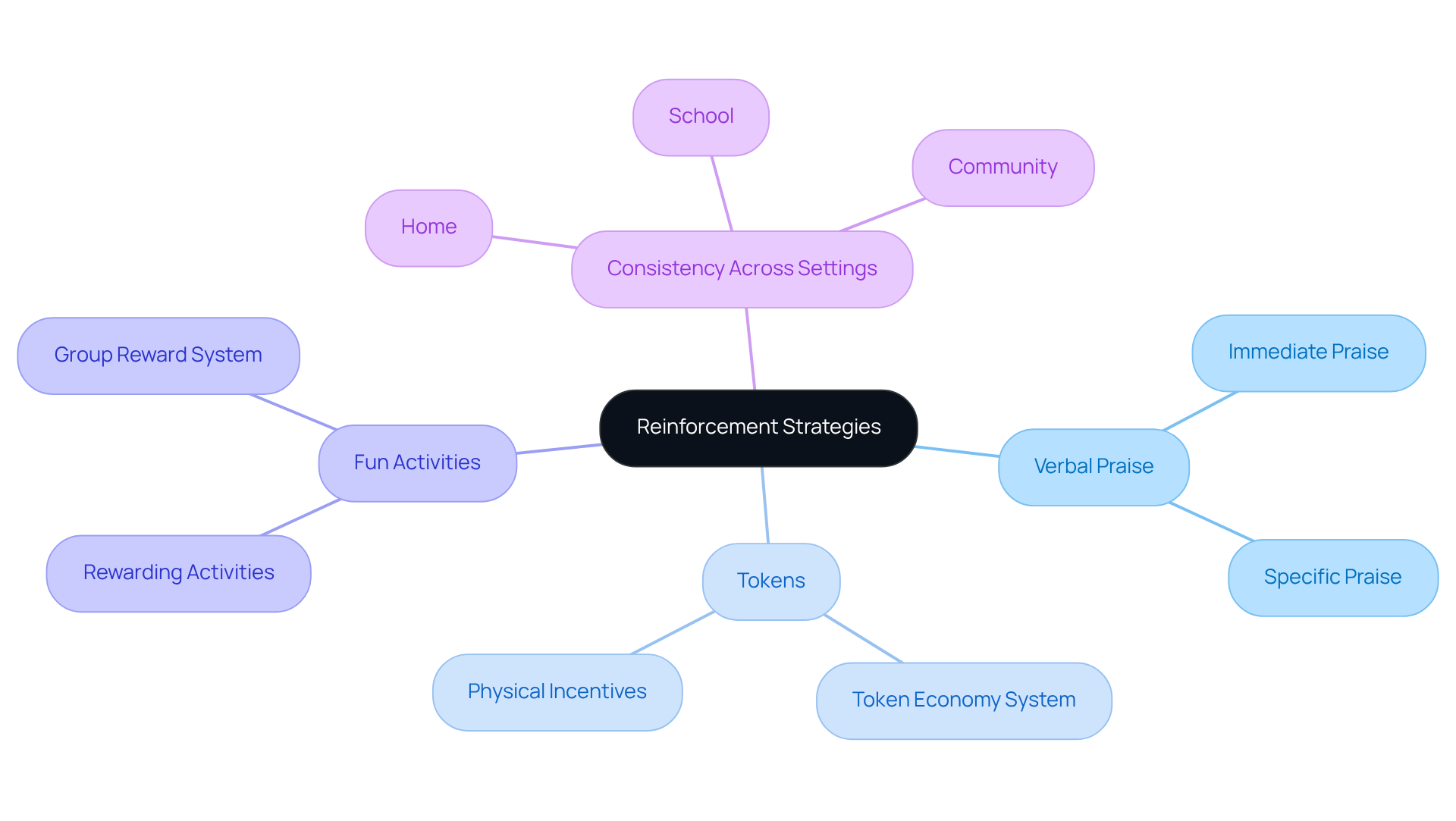
Modeling: Teach Through Observation and Imitation
Modeling is such a powerful technique in ABA therapy! It involves demonstrating desired behaviors for children to observe and imitate. Parents can easily use this method in different situations, like during playtime or daily routines. For instance, if you want to teach your little one how to greet others, you might show them by saying 'hello' while making eye contact with a friend. This visual demonstration helps clarify expectations and encourages your child to replicate the behavior.
Research shows that kids with autism can learn interpersonal skills faster through observational learning, especially when they engage with video modeling methods. In fact, studies indicate that youngsters trained with self-video modeling (SVM) performed interpersonal tasks more quickly and accurately than those who used peer video modeling (PVM). This really highlights how effective modeling can be as a teaching approach for improving social skills.
Incorporating modeling into everyday interactions not only enriches your child's learning experience but also fosters their independence and confidence. By actively participating in your child's educational journey, you can create a nurturing atmosphere that supports the skills being taught. Plus, involving parents in demonstrating interventions has been shown to provide significant benefits, allowing kids to transfer learned behaviors across different settings, like home, school, and the community.
Moreover, Rori Care offers group therapy focused on interpersonal skills, enhancing modeling techniques by providing kids with opportunities to practice in a structured group setting. This therapy boosts interactions and communication, further supporting your child's growth.
Overall, the use of generalization strategies in ABA that blend observation and imitation is crucial for effective skill acquisition. Modeling is highlighted as a key strategy for parents looking to enhance their child's interpersonal abilities through generalization strategies in ABA. Empowering caregivers with ABA principles and strategies, such as data collection and alignment with therapeutic goals, can lead to better behavioral outcomes and create a supportive environment for your child's development. Let’s explore this together!

Personalized narratives are wonderful tools that describe interactions and suitable reactions, serving as valuable resources for youth with autism. Parents can create these stories to address specific scenarios, like sharing toys or joining group activities. Engaging in conversations about these stories allows parents to clarify expected behaviors and outcomes, helping their children understand cues and expectations. This proactive approach not only eases anxiety but also enhances interpersonal interactions, making it easier for kids to connect with peers and adults.
Studies show that using narrative techniques can significantly boost interpersonal skills development, empowering youth to navigate their environments with greater confidence. By incorporating visual aids and clear language, narrative stories simplify complex interpersonal concepts into manageable parts, making them accessible for young learners. Plus, parent-created narratives have been shown to positively influence behavior, highlighting the importance of parental involvement in the learning journey.
As behavior analysts emphasize, narratives can effectively enhance interpersonal understanding, equipping youngsters with the tools they need to thrive in social settings. Moreover, these narratives assist children in recognizing, understanding, and managing their emotions, further improving their ability to interact with others. Parents can find free social stories through resources like Autism Speaks and National Autism Resources, which can help in implementing these strategies effectively.
By integrating generalization strategies ABA along with other principles, caregivers can boost their support, leading to better behavioral outcomes and empowered family dynamics. Let’s explore this together and see how these narratives can make a difference in your child’s life!
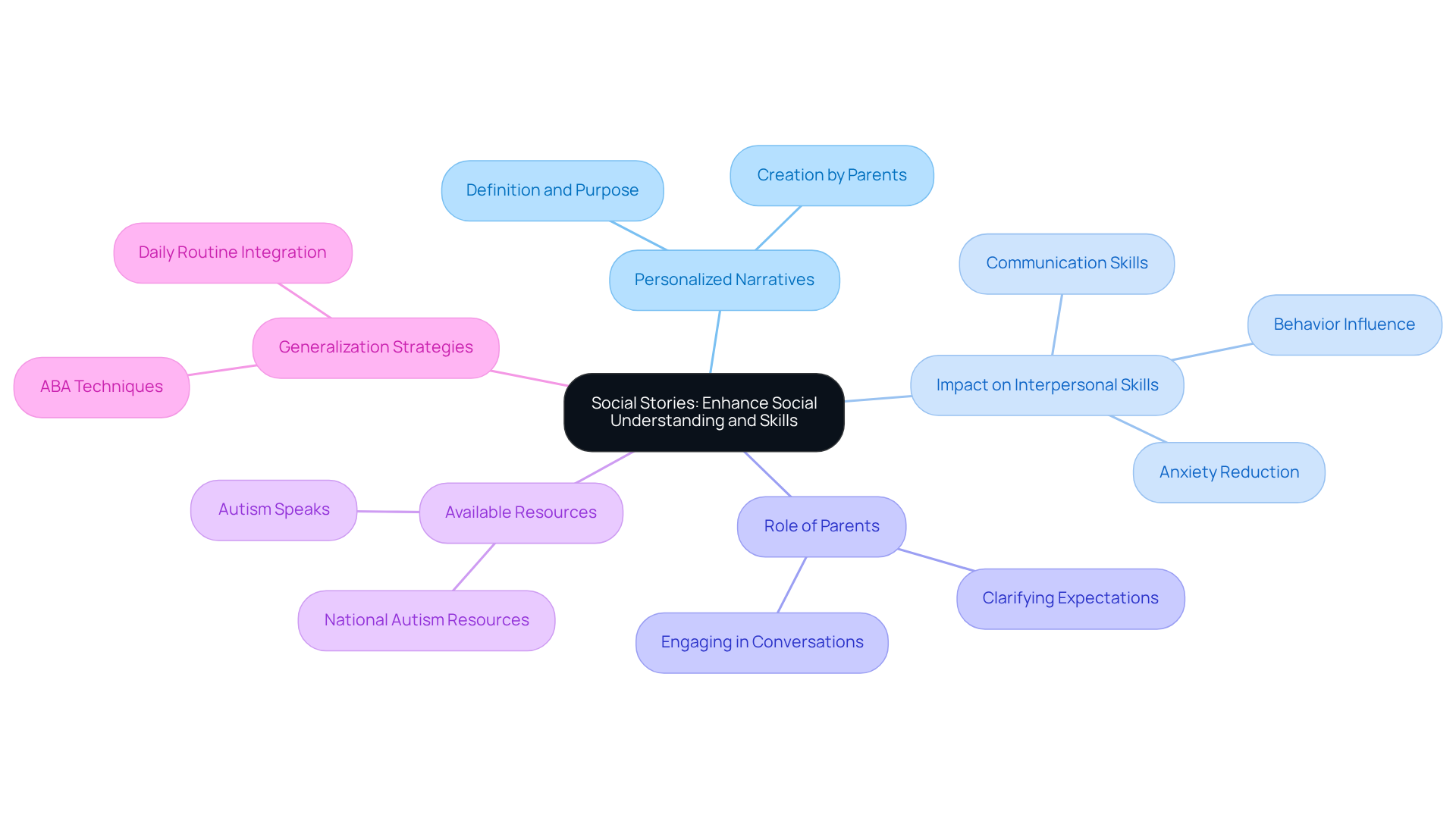
Organized routines are so important for our little ones with autism, ADHD, and learning disabilities. They provide the predictability and security that are key elements of generalization strategies in Applied Behavior Analysis (ABA). As parents, you can create daily schedules that clearly outline specific times for activities like meals, play, and therapy. When we keep routines consistent, our kids can better understand what’s coming next, which helps reduce anxiety and boosts their engagement.
For example, think about a morning routine with visual schedules. This can really help children transition smoothly from one activity to another, reinforcing the skills they've learned in therapy. This organized approach not only supports your child's development but also empowers you as caregivers through the use of generalization strategies in ABA. It equips you with the knowledge to make informed choices that positively influence your child's progress. Let’s explore this together and see how we can make routines work for your family!
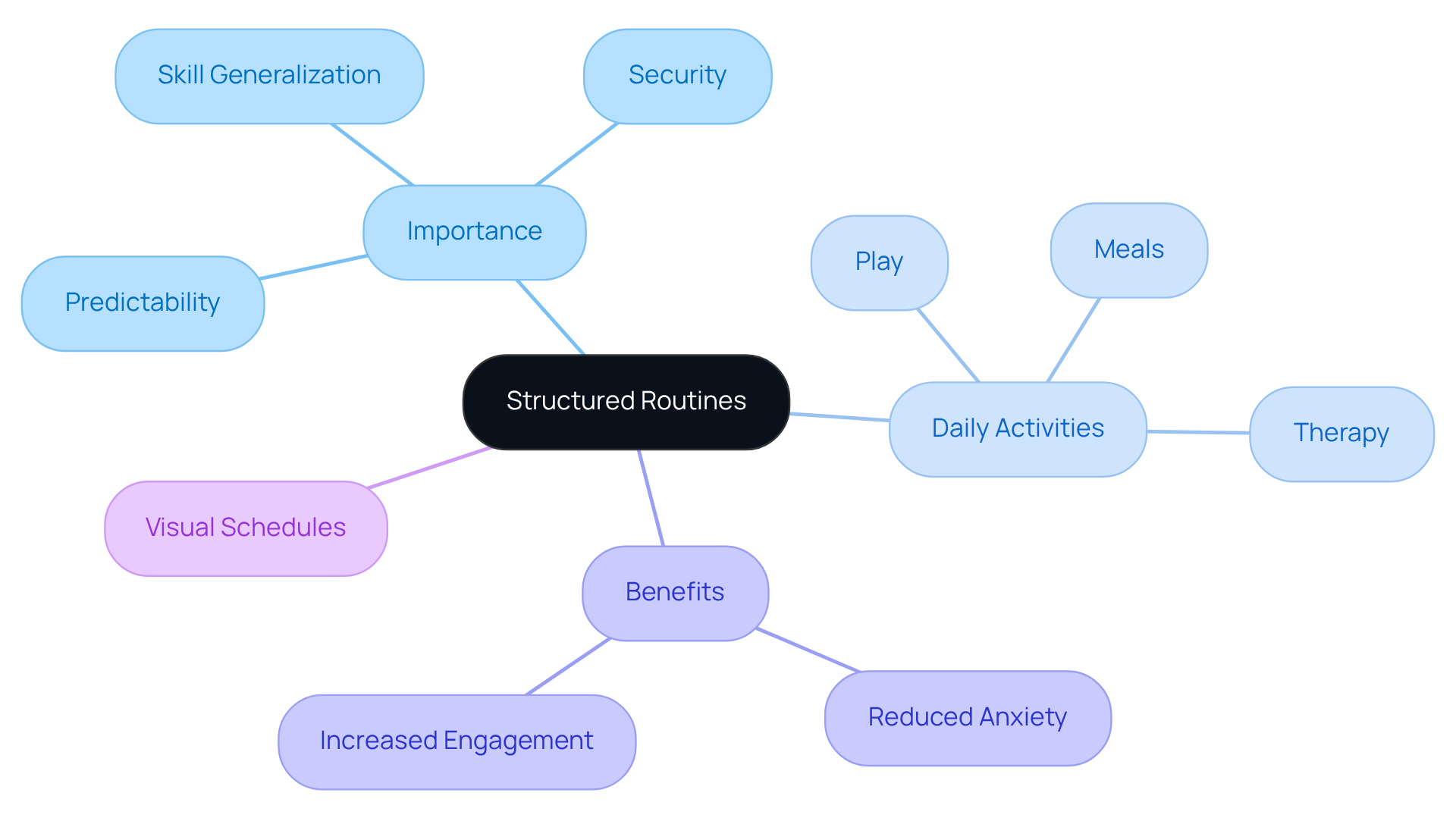
Promoting peer interactions is so important for social skill growth in youngsters with autism! Parents can really help by setting up playdates, group activities, or community events where their kids can connect with peers. These interactions create wonderful opportunities for young individuals to practice communication, sharing, and turn-taking in a natural setting.
For instance, arranging a playdate with a friend can be a great way for youngsters to navigate interpersonal dynamics and build friendships. This not only reinforces the skills they've learned in therapy but also makes the experience fun and engaging! Let’s explore this together and see how we can make these connections happen!
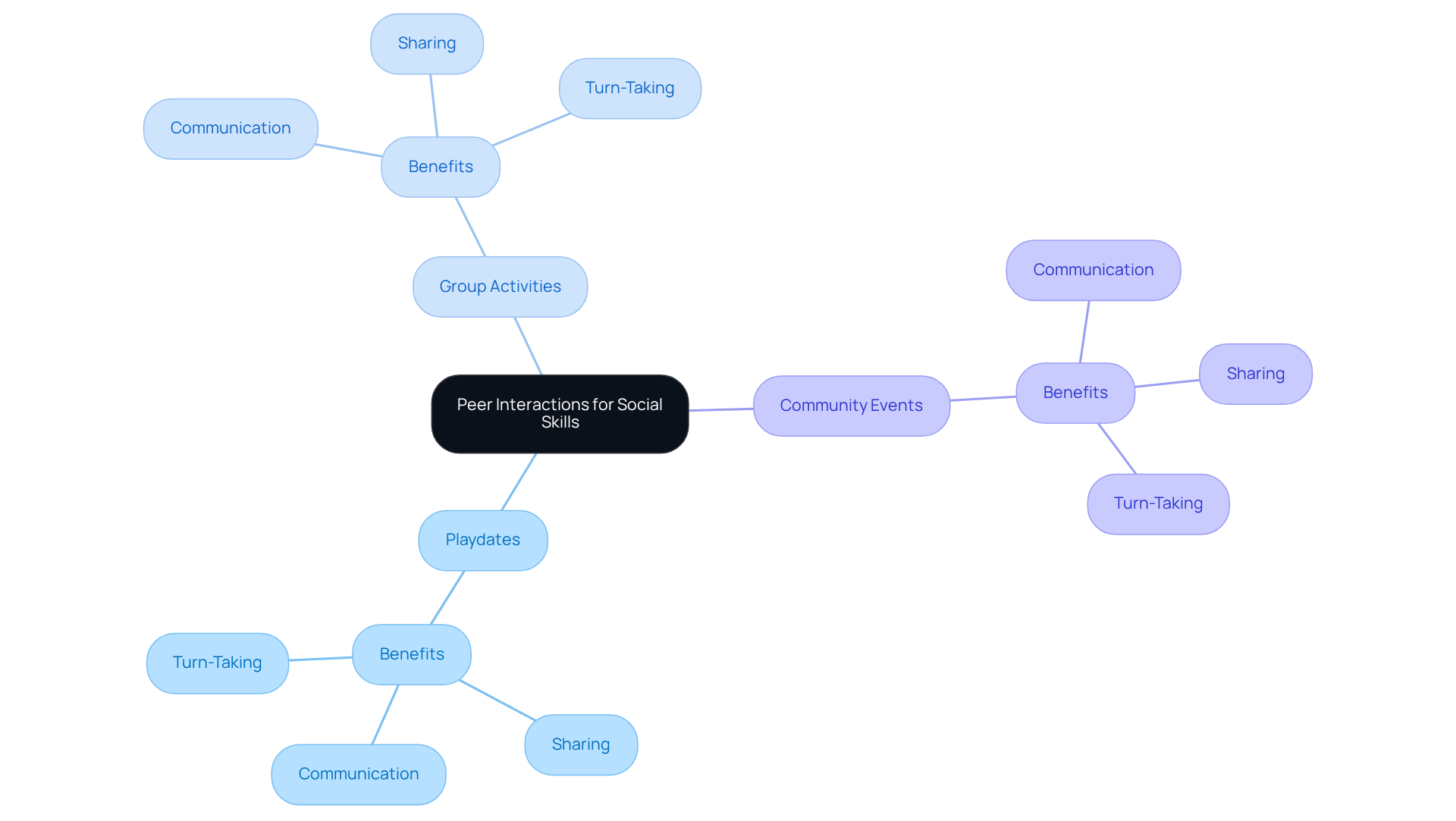
Technology is truly transforming ABA therapy at home! It's providing parents with innovative tools that can enhance their children's learning experiences and empower caregivers. Just think about it—educational apps and interactive games create engaging platforms for kids to practice social skills and communication in a fun, interactive way. 🌟 Research shows that these educational applications significantly boost learning outcomes for individuals with autism, making complex ideas more accessible and enjoyable.
Visual schedules and timers on tablets can also help manage transitions and organize time. They offer clear visual signals that guide young individuals through their daily routines. By incorporating these digital tools, parents can foster a vibrant learning atmosphere that not only reinforces generalization strategies aba but also encourages kids to take an active role in their development.
Plus, personalized support through these technologies ensures that interventions are tailored to each child's unique needs, promoting lasting positive change. As clinicians have pointed out, "The integration of technology into at-home applied behavior analysis (ABA) therapy has transformed the manner in which individuals with autism and other developmental challenges receive support."
And here’s something to consider: the use of AI-driven progress report automation can free up to 50% more time for direct youth treatment! This allows caregivers to focus on implementing effective strategies. However, it's crucial to stay mindful of ethical considerations, like data privacy and security, when using these technologies. By leveraging technology thoughtfully, parents can create a more dynamic and engaging learning environment that empowers both children and caregivers. Let’s explore this together!
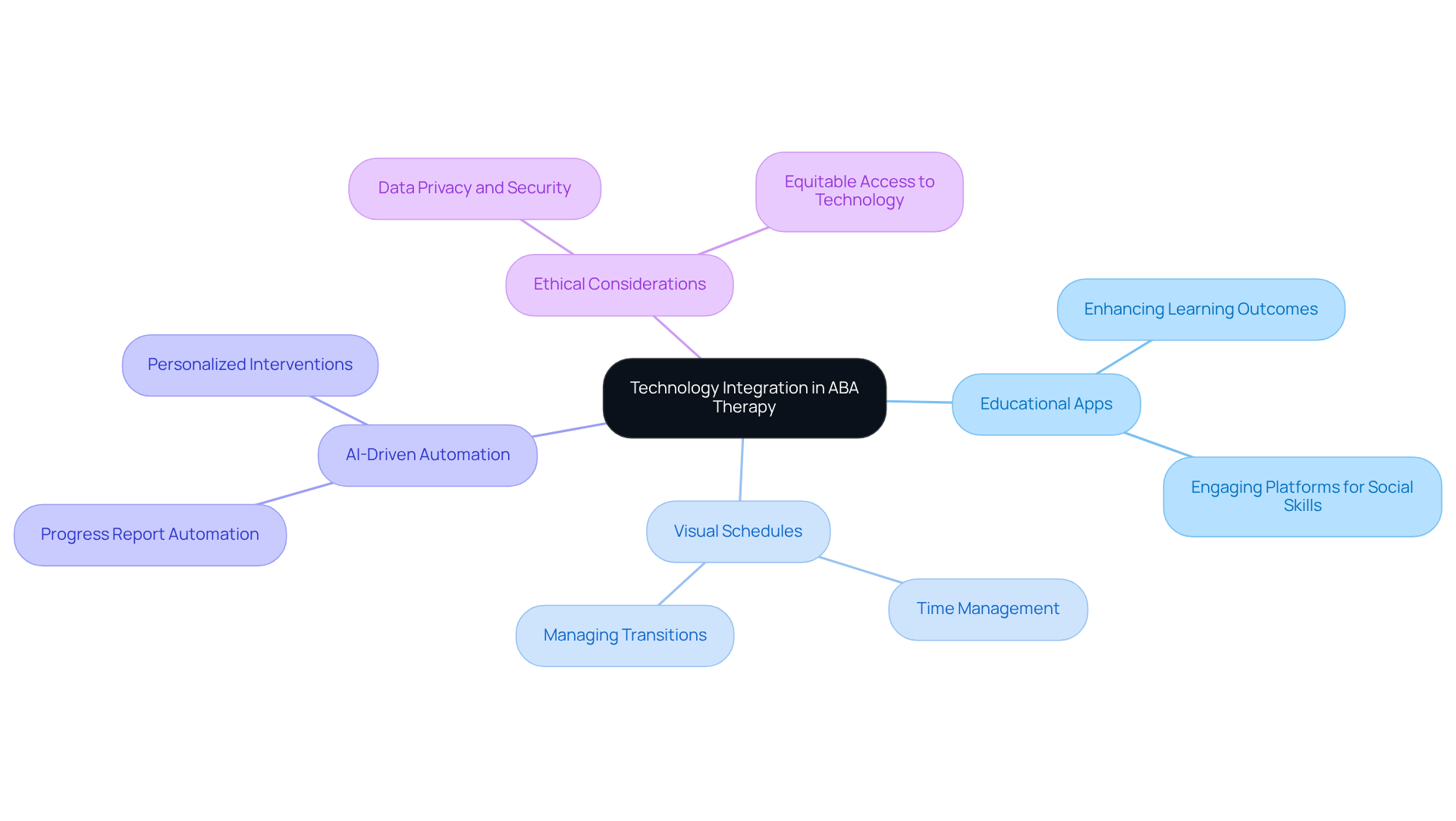
Empowering parents with effective generalization strategies in Applied Behavior Analysis (ABA) is truly essential for fostering skill development and independence in children. By weaving personalized techniques into daily routines, caregivers can create supportive environments that not only enhance learning but also encourage the application of skills across various settings. This tailored approach strengthens the therapeutic process and helps children generalize what they’ve learned in therapy to their everyday lives.
Throughout this article, we’ve highlighted several key strategies, including:
Each of these approaches plays a vital role in promoting understanding, consistency, and engagement, ultimately leading to improved outcomes for children with autism and other developmental challenges. Collaboration between parents and professionals is crucial, allowing for the development of customized plans that cater to each child's unique needs.
As families embrace these strategies, they not only enhance their children's learning experiences but also cultivate an environment of growth and empowerment. By actively participating in their child's ABA journey, parents can make a lasting impact on their development and social integration. The journey may present challenges, but with the right tools and support, caregivers can successfully navigate this path, reinforcing the significance of generalization strategies in fostering independence and success for their children. Let’s explore this together, and remember, we’re here to help you every step of the way!
What is the main goal of personalized generalization strategies in ABA therapy at Rori Care?
The main goal is ability generalization, which is the ability to use learned skills in different settings. This involves creating individualized plans that fit seamlessly into everyday life.
How can parents support their child's learning at home?
Parents can create opportunities for their child to practice learned skills in various situations at home, such as mealtime or playtime, reinforcing their learning and boosting their ability to generalize what they've learned.
What benefits do children experience when parents are involved in ABA therapy?
Research shows that when parents are involved, children often see better outcomes, including improved communication and social skills, leading to greater independence.
How should treatment plans be managed in ABA therapy?
Treatment plans should be regularly updated based on progress reports to reflect the child's evolving needs and ensure they continue to receive appropriate support.
What challenges might arise during ABA therapy, and how can they be addressed?
Challenges such as inconsistent progress or difficulties with generalization may occur, but they can be tackled using adaptive strategies and ongoing evaluation.
What role do visual supports play in ABA therapy?
Visual supports, like schedules and charts, help young individuals understand what to expect and create a clear framework for daily activities, reinforcing skills learned during therapy.
How can caregivers contribute to creating visual aids?
Caregivers can create visual aids that reflect their loved one's daily routines, which helps reinforce skills and apply them to real-life situations.
What is Natural Environment Teaching (NET) and how can it be integrated into daily life?
NET focuses on making learning applicable in daily life. Parents can integrate it by identifying teachable moments during everyday activities, such as grocery shopping or cooking, to help children apply their skills in real-world settings.
How does involving qualified behavior analysts benefit the ABA therapy process?
Qualified behavior analysts design personalized plans that align with generalization strategies, ensuring that families receive the support they need for better behavioral outcomes and informed decisions.